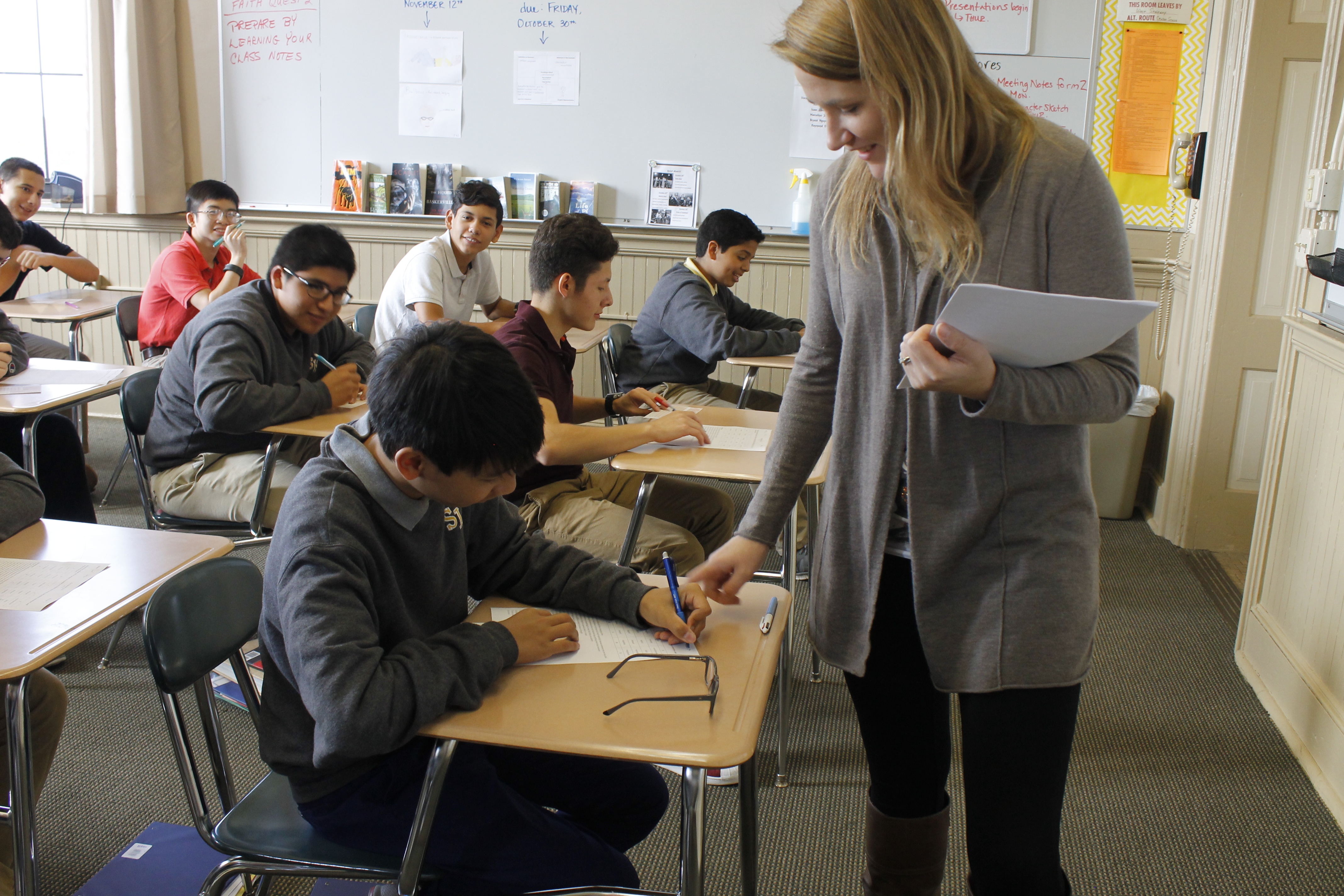Parents play a crucial role in supporting their children in the unique and demanding environment of boarding schools, where academic rigor often intertwines with a student’s overall well-being.
This article aims to explore the challenges boarding school students face, provide insights into recognizing signs of stress, and offer practical strategies for parents to foster academic success and wellness in their children by balancing academics and wellness together.
Understanding the Boarding School Environment

Boarding schools operate on a distinctive model where students live on campus, immersed in a tight-knit community.
This structure brings challenges, including increased academic expectations, social pressures, and homesickness. Parents need to grasp the nuances of this environment to support their children in balancing academics and wellness.
Overview of Boarding School Structures
Boarding schools offer an immersive educational experience with students living on campus. The close-knit community fosters deep connections and encourages a sense of belonging and balancing academics and wellness.
Unique Stressors Faced by Boarding School Students
The separation from family and home, combined with high academic expectations, can create stressors unique to the boarding school experience.
Impact of Boarding School Life on Student Wellness
The intensity of the boarding school environment can impact a student’s mental, emotional, and physical well-being. Parents must be attuned to these effects and provide appropriate support.
The Role of Parents in Supporting Wellness
Parents play a crucial role in maintaining a balance between academic achievement and the well-being of their children. Understanding the challenges and actively participating in their child’s boarding school life is key to providing effective support and balancing academics and wellness.
Signs of Academic and Emotional Stress

Recognizing the signs of stress is the first step in addressing challenges effectively. Both academic and emotional indicators should be considered.
Academic Stress Indicators
High Expectations and Academic Pressure:
- A sudden decline in grades or academic performance.
- Expressing feelings of being overwhelmed or under constant pressure to excel.
Fear of Failure and Perfectionism:
- Persistent anxiety about making mistakes.
- Unhealthy perfectionism leads to a fear of not meeting expectations.
Emotional Wellness Warning Signs
Homesickness and Social Isolation:
- Frequent expressions of missing home or family.
- Withdrawal from social activities or isolation from peers.
Behavioral Changes and Mood Swings:
- Noticeable changes in behavior or mood.
- Unexplained shifts in emotional well-being.
Strategies for Balancing Academics and Wellness

To ensure a holistic approach, parents can implement various strategies to support both academic success and their children’s overall wellness.
Effective Communication with School Staff
Establishing Regular Communication Channels:
- Regularly communicate with teachers and school staff to stay informed about your child’s academic progress and well-being.
- Utilize school-provided communication platforms to facilitate ongoing dialogues.
Collaborating with Teachers and Counselors:
- Attend parent-teacher conferences to gain insights into your child’s academic strengths and areas for improvement and help in balancing academics and wellness.
- Collaborate with school counselors to address your child’s emotional or social challenges.
Encouraging a Healthy Work-Life Balance
Setting Realistic Academic Expectations:
- Encourage your child to set realistic academic goals.
- Discuss the importance of balance and acknowledge that academic success does not solely define one’s worth and balancing academics and wellness.
Emphasizing the Importance of Downtime:
- Stress the significance of breaks and relaxation.
- Support extracurricular activities that provide an outlet for relaxation and personal interests.
Promoting Physical Wellness
Encouraging Regular Exercise:
- Advocate for participation in sports or physical activities.
- Emphasize the connection between physical well-being and mental health.
Emphasizing the Importance of Healthy Nutrition:
- Discuss the role of nutrition in maintaining overall health.
- Encourage a balanced and nutritious diet, even within the constraints of a boarding school environment.
Nurturing Emotional Intelligence
Fostering Open Conversations About Emotions:
- Create a safe space for your child to express their emotions.
- Discuss healthy ways to cope with stress and anxiety.
Introducing Stress-Management Techniques:
- Teach stress-management techniques such as mindfulness, deep breathing, or meditation.
- Encourage the exploration of activities that promote relaxation and emotional well-being.
Establishing Supportive Routines

Establishing routines can provide stability and support in navigating the challenges of boarding school life.
Structuring Daily and Weekly Schedules
Balancing Study Time with Relaxation:
- Help your child create a schedule that includes dedicated study time and breaks.
- Emphasize the importance of downtime to recharge.
Incorporating Regular Check-ins:
- Schedule regular check-ins to discuss academic progress and emotional well-being.
- Adjust schedules based on evolving needs and challenges.
Weekends and Breaks: Finding a Healthy Balance
Encouraging Rest and Rejuvenation:
- Advocate for restful weekends to allow for physical and mental rejuvenation.
- Support healthy activities during breaks that promote relaxation and balancing academics and wellness.
Facilitating Meaningful Family Time:
- Plan visits or virtual family time during breaks.
- Create a supportive environment where your child feels connected to home.
Collaborating with Boarding School Staff

Active collaboration with school staff is essential for a comprehensive understanding of your child’s boarding school experience.
Building a Supportive Relationship with Teachers
Attending Parent-Teacher Conferences:
- Attend conferences to discuss academic progress and address concerns.
- Establish a collaborative relationship with your child’s teachers.
Seeking Academic and Emotional Updates:
- Regularly request updates on your child’s emotional and social well-being.
- Share any relevant information about changes or challenges at home.
Utilizing Counseling Services
Encouraging Students to Access Support:
- Advocate for your child to seek counseling services if needed.
- Reduce stigma around seeking emotional support.
Participating in Family Counseling Sessions:
- Consider participating in family counseling sessions to address family-related challenges affecting your child.
- Collaborate with counselors to create a comprehensive support plan.
Addressing Academic Challenges

Proactive identification and addressing of academic challenges are crucial for promoting overall well-being.
Identifying and Addressing Learning Difficulties
Recognizing Signs of Learning Challenges:
- Be attentive to signs of learning difficulties, such as struggles with certain subjects.
- Advocate for appropriate assessments if needed.
Collaborating with Educational Support Services:
- Collaborate with educational support services to address specific academic challenges.
- Explore tutoring or additional resources to support learning.
Balancing Academic Ambitions with Student Well-Being
Encouraging Passion Pursuit:
- Support your child’s pursuit of academic interests and passions.
- Emphasize that success can be achieved through personal growth and fulfillment.
Recognizing the Importance of Personal Growth:
- Shift the focus from external achievements to personal growth.
- Discuss the value of resilience, adaptability, and a love for learning.
Navigating Social Dynamics
Understanding and navigating social dynamics in boarding schools is essential for supporting your child’s emotional well-being.
- Understanding Peer Relationships in Boarding Schools
- Encouraging Healthy Friendships:
- Discuss the importance of building supportive and positive friendships.
- Encourage open communication about social dynamics.
- Addressing Bullying and Social Pressures:
- Be proactive in addressing any signs of bullying or social pressures.
- Collaborate with school staff to create a safe and inclusive environment.
- Fostering a Sense of Community
- Supporting Extracurricular Engagement:
- Encourage participation in extracurricular activities to foster a sense of community.
- Emphasize the benefits of collaboration and shared experiences.
- Participating in Parent-Student Events:
- Attend parent-student events to connect with other families.
- Foster a community that extends beyond the academic realm.
Cultivating Independence and Resilience
Promoting independence and resilience prepares students for the challenges they may face in and beyond boarding school life.
- Empowering Students to Take Initiative
- Teaching Decision-Making Skills:
- Encourage your child to make independent decisions and take initiative.
- Discuss the consequences of choices and the importance of learning from experiences.
- Allowing Space for Personal Growth:
- Provide space for your child to explore personal interests and hobbies.
- Support autonomy in decision-making within a framework of safety and guidance.
- Nurturing Resilience in the Face of Challenges
- Framing Setbacks as Learning Opportunities:
- Reframe setbacks as opportunities for growth and learning.
- Discuss the importance of resilience in overcoming challenges.
- Encouraging Adaptive Coping Strategies:
- Teach adaptive coping strategies to navigate stress and adversity.
- Foster a mindset that views challenges as opportunities for skill development.
Celebrating Achievements, Big and Small
Recognizing and celebrating achievements contributes to a positive and supportive environment.
- Recognizing Academic Milestones
- Celebrating Academic Achievements:
- Acknowledge and celebrate academic successes, whether big or small.
- Reinforce the idea that effort is as important as outcomes.
- Acknowledging Effort and Improvement:
- Emphasize the value of continuous improvement.
- Celebrate the effort put into overcoming challenges.
- Embracing Non-Academic Successes
- Commending Personal Growth and Character Development:
- Recognize instances of personal growth and character development.
- Reinforce the importance of qualities such as resilience, empathy, and kindness.
- Highlighting Contributions to the Community:
- Celebrate contributions to the broader community, including extracurricular activities and social initiatives.
- Foster a sense of purpose beyond academic achievements.
Conclusion
Balancing academics and wellness in the context of boarding school life requires a thoughtful and collaborative approach. By understanding the unique challenges, proactively addressing signs of stress, and implementing strategies that promote both academic success and well-being, parents can create a supportive environment for their children.








